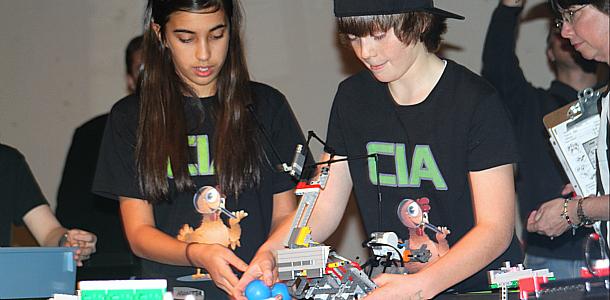The CIA paid JC a visit during the FIRST LEGO League (FLL) robotics competition on Saturday, Dec. 17. The Chicken Investigation Agency, that is.
This event marked JC’s second year hosting the FIRST (For Inspiration and Recognition of Science and Technology) LEGO League robotics competition. FLL is an international competition organized by FIRST for elementary and middle school students ages 9-14.
Food Factor was announced on Sept. 2 as the theme for the 2011-12 competition, and focuses on food safety and methods to prevent contamination. Teams from all over Harford County and East Baltimore County were tasked with identifying a food item and tracking its journey from creation to consumption.
According to the CIA team profile, “Our goal is to make commercial chicken coops cleaner and healthier for the chickens to prevent the need for antibiotics, and to inform and educate the community about antibiotic resistance and prevention.”
A group of home-schooled children in affiliation with Techbrick Robotics in Abingdon, the CIA received the Champion Award. They will be advancing to the state finals with the Rock N Rollbots, the Battle Pi3rates, the Germbusters, and the Robot Brothers.
According to Science Department Chair and Qualifier Organizer Rebecca Jansing-Kaestner, “[The FLL robotics competition] is a lot of fun in an area other than sports where kids can excel. They get a chance to do something academic and geeky.”
According to the FLL website, there are four main sections of the competition. First is the teamwork activity, during which students participate in a teamwork exercise. Second is the technical presentation, where students demonstrate that their robot is designed appropriately for the tasks given.
ROBO SQUAD team member Jonah Lane explained that preparing for this section was his favorite activity. “I like building robots and programming them,” Lane said.
Flavor Ahoy team member Andrew Robey echoed these sentiments. “The programming is my favorite and building stuff. I like it because of all the stuff I get to do with my friends,” Robey said.
The third section of the competition is the research project. Teams have to identify potential sources of contamination and create solutions to those problems. Teams then share their results with the community and with the judges at the competition.
“Teams have to research a topic and find information, then document all of it,” Jansing-Kaestner said. “They have to come up with a skit or other clever way to present to the judges. They present a five minute skit, then have a five minute question and answer session [with the judges].”
“It’s basically about food safety. One group did a presentation on pasteurization; another did theirs on chicken, another on seafood,” Jansing-Kaestner said.
Judge Drew Wilkerson expresses the importance of such programs. “This is a matter of national security. We need smart young people building the next technologies for our country,” Wilkerson said.
The portion of the competition that draws the most excitement is the Robot Game, wherein students use the robots that they designed and built to autonomously complete a set of tasks on a playing field.
“I like the Robot Game itself. There are lots of different neat parts,” Jansing-Kaestner said.
This year’s Food Factor mat included objectives like Pest Removal, where rats were removed from a cargo ship for points. In another objective, Hand Wash, bacteria and viruses could be placed in a sink for points.
The competition impressed volunteer senior Amanda Weerasooriya. “It was very interesting to see kids come and participate in something that involves a lot of time, creativity, teamwork, and research,” Weerasooriya said.
Gatorbots #1 coach Amy Harmon-Krtanjek believes that the children get a lot out of the competition. “They learn programming and scientific facts, but the biggest thing they learn is how to work together. Everyone brings something to the party,” Harmon-Krtanjek said.
Rock N Rollbots team member Corey Sekulow confirms the benefits of the competition. “My favorite thing about FLL is to gain new experiences and meet new kids. We learn that our idea isn’t always the right idea,” Sekulow said.
Adam Kuester is News Editor for The Patriot and jcpatriot.com.



